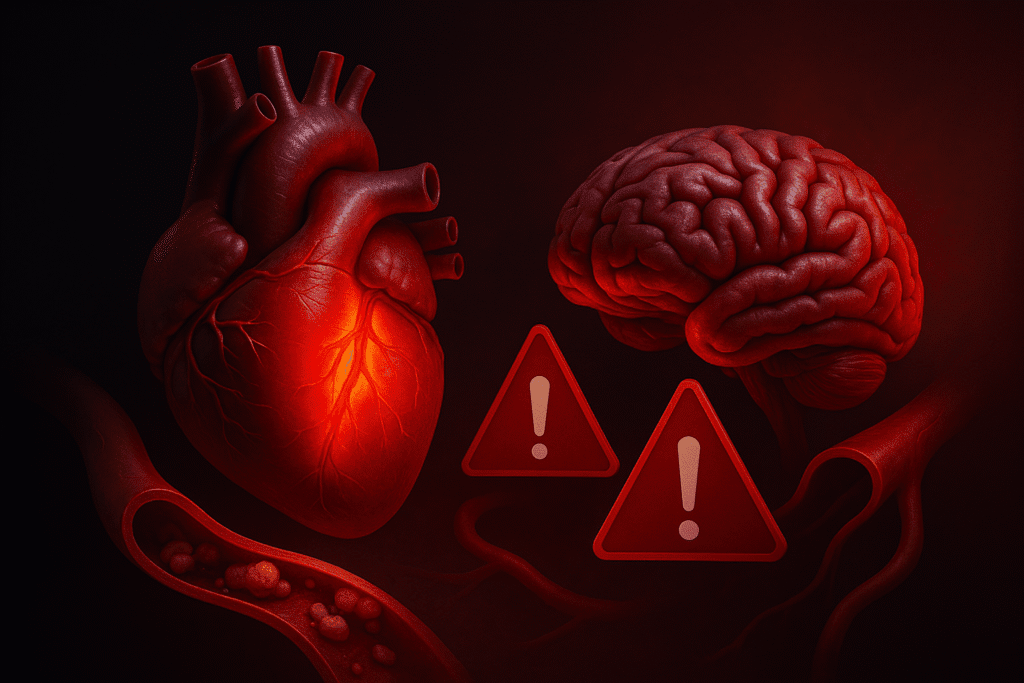Ever thought your toothbrush could be as important as your gym membership? It might sound crazy, but brushing and flossing daily could literally help you live longer. More and more research is revealing a powerful link between the oral hygiene and the health of your heart.
The Mouth and Heart Connection
What is Periodontal Disease?
Periodontal (gum) disease is an infection of the tissues that hold your teeth in place. It’s usually caused by poor brushing and flossing habits that allow plaque a sticky film of bacteria to build up and harden. If untreated, it can lead to sore, bleeding gums, painful chewing problems, and even tooth loss.

Your Gums and Heart Are Connected
Inflammation and bacterial infections in the mouth don’t just stay there; they can have serious consequences for your heart. Here’s what the evidence shows:
1. A landmark study published in the British Medical Journal (2010) analyzed data from over 11,000 adults and found that individuals who rarely brushed their teeth had a 70% higher risk of developing heart disease compared to those who brushed at least twice a day. This emphasizes the critical role of consistent oral hygiene in protecting heart health.
2. The Journal of Periodontology (1996) reported that people with periodontal (gum) disease are twice as likely to suffer from coronary artery disease. The chronic inflammation from gum infections may contribute to arterial plaque buildup and cardiovascular complications.
3. A statement from the American Heart Association published in Circulation (2012) linked periodontal disease with increased systemic inflammation, which plays a key role in atherosclerosis the hardening and narrowing of arteries due to plaque buildup.
4. Harvard Health Publishing also recognizes that poor oral health may serve as an early warning sign for heart conditions. Gum disease and cardiovascular disease share common risk factors such as smoking, diabetes, and chronic inflammation.
How Bacteria Travel from Gums to Arteries?
When your gums are inflamed, bacteria can enter the bloodstream and travel throughout your body. These bacteria often latch onto blood vessel walls, contributing to plaque buildup in arteries a leading cause of heart disease.
Chronic Inflammation: The Silent Killer
Inflamed gums = inflamed arteries. Chronic inflammation is the body’s overreaction to ongoing infection or irritation. In this case, gum disease can spark systemic inflammation that stresses your cardiovascular system. Over time, this increases your risk for heart attacks and strokes.
Key Mechanisms
- Entry Point: Inflamed, bleeding gums provide access for bacteria into the bloodstream.
- Travel: Bacteria circulate and settle in blood vessels, especially where there’s existing damage.
- Inflammatory Response: The immune system reacts, causing inflammation that worsens arterial plaque buildup.
- Cardiovascular Risk: Over time, this raises the risk of serious cardiovascular events.
Risk Factors that Overlap
Many of the habits and conditions that damage your gums are the same ones that can harm your heart.
Lifestyle Triggers That Affect Both Mouth and Heart
Common lifestyle factors like smoking, high sugar diets, physical inactivity, and poor stress management significantly contribute to both periodontal disease and cardiovascular problems.
- Smoking impairs blood circulation, weakening the body’s ability to fight infection. It restricts oxygen and nutrient delivery to gum tissue and damages arteries, increasing your risk of both gum recession and heart disease.
- High sugar consumption promotes both tooth decay and systemic inflammation, which can worsen both gum health and cardiovascular function.
- Lack of physical activity contributes to poor immune response, metabolic disorders, and increased inflammation, all of which affect both oral and heart health.
Medical Conditions with Dual Impact
Diabetes significantly increases the risk of gum disease due to impaired immune function and poor wound healing. At the same time, it raises the risk of cardiovascular disease by contributing to inflammation and arterial damage.
Poor nutrition particularly diets low in essential vitamins, minerals, and antioxidants can weaken the gums and immune system while also increasing blood pressure, cholesterol, and other cardiovascular risk factors.
How Poor Oral Hygiene Affects the Body?
Neglecting your oral hygiene doesn’t just lead to cavities and bad breath it can have serious consequences for your entire body, especially your heart and blood vessels. Here’s how:
Immune System Overload from Gum Infections
When harmful bacteria build up in the mouth due to poor oral hygiene, your immune system reacts. It releases white blood cells and inflammatory proteins to fight the infection. If gum disease becomes chronic, this immune response never shuts off, creating low grade systemic inflammation throughout the body.
Over time, this constant immune activation can damage blood vessels and strain the heart, making it more susceptible to atherosclerosis, high blood pressure, and other cardiovascular problems.

Increased Risk of Heart Attacks and Strokes
Chronic gum inflammation doesn’t just affect the gums it can also:
- Trigger the formation of blood clots, which may block arteries.
- Disrupt normal blood flow, increasing the chance of a heart attack or stroke.
- Contribute to the buildup of plaque inside artery walls, further narrowing vessels and elevating cardiovascular risk.
This makes gum disease a silent contributor to life-threatening events.
Floss Like Your Life Depends on it Because it Might
Daily flossing removes plaque and bacteria from between the teeth areas your toothbrush can’t reach. Regular flossing, brushing, and dental visits reduce inflammation, lower bacterial load, and help protect both your oral and heart health.
Dental Warning Signs You Shouldn’t Ignore
Here are key dental warning signs that require prompt attention:
Bleeding Gums and Persistent Bad Breath
Bleeding gums during brushing or flossing, along with chronic bad breath (halitosis), are often early signs of gingivitis, the first stage of gum disease. While they may not cause pain, they indicate inflammation and bacterial buildup in the gums.
If left untreated, gingivitis can progress to periodontitis, a more severe infection that increases the risk of systemic inflammation a factor strongly linked to heart disease.
Loose Teeth and Receding Gums
When teeth begin to feel loose or gums appear to be pulling away, it’s a sign that bacteria have penetrated deep into the gum tissue and bone. This advanced gum disease can cause:
- Loss of supporting bone structure
- Deep periodontal pockets filled with bacteria
- Elevated inflammation levels throughout the body
This not only threatens your oral health but may also contribute to the development of atherosclerosis, heart attacks, or stroke due to circulating bacteria and inflammatory markers.
Common Myths Busted
- “Bleeding Gums Are Normal” – No, They’re Not
- Bleeding gums are not just “aggressive brushing.” They signal inflammation and possible disease.
- “Heart Disease Runs in the Family, So I Can’t Avoid It”
Genes may load the gun, but lifestyle pulls the trigger. Oral hygiene is one piece of the prevention puzzle.
Can Dentists Predict Heart Trouble?
The Dentist’s Role in Detecting Heart Risk
Chronic gum inflammation and oral infections don’t just stay in the mouth they can affect the entire body, especially the cardiovascular system. As awareness grows, some dentists are now trained to look for warning signs of systemic disease, including:
- Severe or chronic gum disease
- Persistent oral inflammation
- Unexplained oral tissue changes
Some forward thinking dental clinics are also beginning to screen for inflammatory biomarkers (such as C-reactive protein or interleukin levels) that are associated with increased cardiovascular risk.
What New Technology is Telling Us?
Innovative technologies are now pushing the boundaries of dental diagnostics:
- Saliva testing: Research shows that saliva can contain biomarkers linked to systemic inflammation, cholesterol levels, and even heart disease risk. Dentists may soon use non-invasive saliva tests to help identify cardiovascular risk during routine checkups.
- Artificial Intelligence (AI): AI is being developed to analyze dental X-rays, periodontal health, and oral tissue changes to flag patients at elevated risk of heart disease. This could revolutionize how dentists contribute to preventive medicine.

Lifestyle habits that Benefit both Teeth and Heart
Here are lifestyle habits that benefit both your mouth and your heart and how just a few minutes a day can make a big difference.
Follow the “2×2 Rule”
Your 5 Minutes Daily Routine for a Healthier Heart
Incorporate this simple oral care routine:
- Brush for two minutes, twice daily (the “2×2 Rule”)
- Use an antibacterial mouthwash to reduce pathogens that brushing may miss
- Scrape your tongue to eliminate odor causing and inflammation triggering bacteria
This routine supports a healthy oral microbiome and may help lower systemic inflammation, benefiting your cardiovascular system as well.
Stop Smoking
Smoking is a well known risk factor for both gum disease and heart disease. It reduces blood flow, impairs immune function, and contributes to plaque formation in arteries. Quitting smoking improves healing in gum tissue and reduces cardiovascular risk dramatically.
Eat a Heart Healthy and Tooth Friendly Diet
What you eat has a direct impact on your mouth and your heart. A nutritious diet can reduce cavity causing bacteria and inflammation, while also promoting better cardiovascular health and oral hygiene.
Prioritize:
- Fiber-rich fruits and vegetables
- Whole grains and lean proteins
- Calcium and vitamin D (for tooth and bone strength)
- Low sugar and low processed foods to reduce metabolic stress and gum inflammation
Stay Physically Active
Exercise improves circulation, immune function, and helps regulate blood sugar and blood pressure key factors in both oral and cardiovascular health. Physical activity also supports wound healing in gum tissue and lowers the body’s inflammatory burden.
Just 30 minutes of moderate activity five days a week can reduce heart disease risk by up to 30% and help your gums heal faster, too.
Manage Chronic Stress
Chronic stress increases cortisol and other inflammatory chemicals in the body. This weakens immune responses in the gums and contributes to increased blood pressure and heart strain. It can also lead to teeth grinding (bruxism) and poor oral hygiene habits.
Stress management strategies that benefit both heart and oral health:
- Mindfulness or meditation
- Deep breathing exercises
- Adequate sleep and hydration
Visit Your Dentist Regularly
Routine dental checkups help detect early signs of gum disease, cavities, and oral infections before they become severe enough to impact systemic health. Some progressive dental practices even screen for inflammatory markers linked to heart disease.

Simple Oral Hygiene Tips
- Brushing Technique Matters.
- Use a soft bristled brush and 45° angle to the gums. Don’t scrub hard clean smart.
- The Right Tools for the Right Results.
- Electric toothbrushes, floss picks, and water flossers are game changers if you struggle with technique or motivation.
Conclusion
So, is brushing and flossing really about more than just fresh breath? Absolutely. The connection between oral hygiene and heart health is growing stronger with every study. That toothbrush on your sink? It’s a silent guardian of your cardiovascular system. So brush, floss, and live longer your heart will thank you for it.
FAQs
1. Can gum disease directly cause heart attacks?
Not directly, but the inflammation and bacteria from gum disease contribute to arterial damage, which increases heart attack risk.
2. How often should I visit the dentist for heart health benefits?
Twice a year is the general rule, but if you have gum disease or heart risk, your dentist may recommend more frequent visits.
3. Is mouthwash enough if I don’t floss?
Nope. Mouthwash reduces surface bacteria but doesn’t reach the sticky plaque between teeth like floss does.
4. Can heart medications affect my oral health?
Yes, some meds cause dry mouth, which can increase the risk of gum disease. Talk to your dentist about it.
5. Are electric toothbrushes more effective for heart conscious care?
Yes! They clean more thoroughly, especially if you have dexterity issues or trouble brushing properly.
